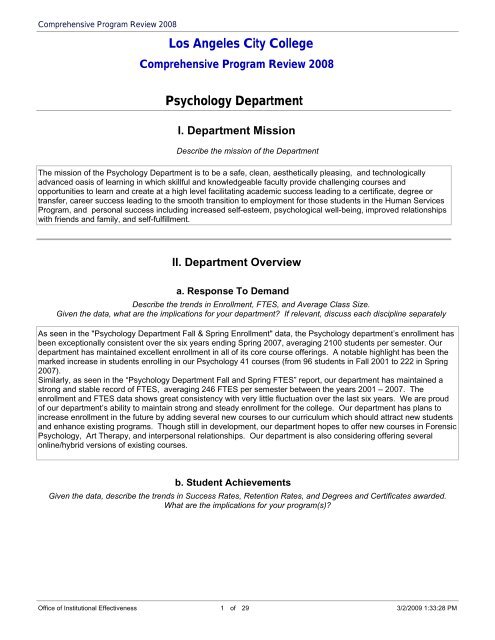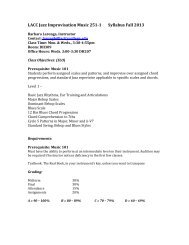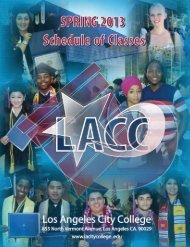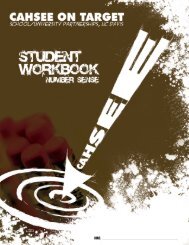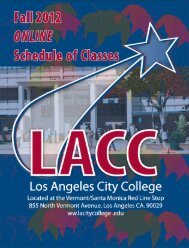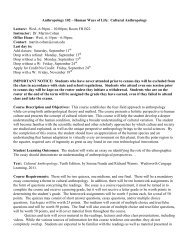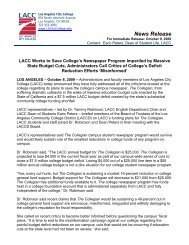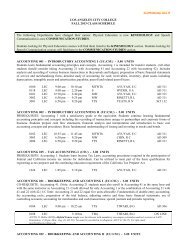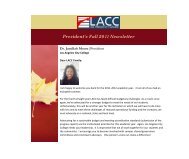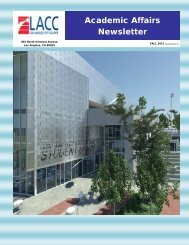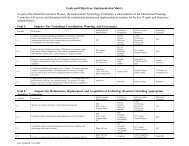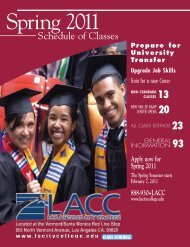Los Angeles City College Psychology Department
Los Angeles City College Psychology Department
Los Angeles City College Psychology Department
Create successful ePaper yourself
Turn your PDF publications into a flip-book with our unique Google optimized e-Paper software.
Comprehensive Program Review 2008<br />
<strong>Los</strong> <strong>Angeles</strong> <strong>City</strong> <strong>College</strong><br />
Comprehensive Program Review 2008<br />
<strong>Psychology</strong> <strong>Department</strong><br />
I. <strong>Department</strong> Mission<br />
Describe the mission of the <strong>Department</strong><br />
The mission of the <strong>Psychology</strong> <strong>Department</strong> is to be a safe, clean, aesthetically pleasing, and technologically<br />
advanced oasis of learning in which skillful and knowledgeable faculty provide challenging courses and<br />
opportunities to learn and create at a high level facilitating academic success leading to a certificate, degree or<br />
transfer, career success leading to the smooth transition to employment for those students in the Human Services<br />
Program, and personal success including increased self-esteem, psychological well-being, improved relationships<br />
with friends and family, and self-fulfillment.<br />
II. <strong>Department</strong> Overview<br />
a. Response To Demand<br />
Describe the trends in Enrollment, FTES, and Average Class Size.<br />
Given the data, what are the implications for your department? If relevant, discuss each discipline separately<br />
As seen in the "<strong>Psychology</strong> <strong>Department</strong> Fall & Spring Enrollment" data, the <strong>Psychology</strong> department’s enrollment has<br />
been exceptionally consistent over the six years ending Spring 2007, averaging 2100 students per semester. Our<br />
department has maintained excellent enrollment in all of its core course offerings. A notable highlight has been the<br />
marked increase in students enrolling in our <strong>Psychology</strong> 41 courses (from 96 students in Fall 2001 to 222 in Spring<br />
2007).<br />
Similarly, as seen in the “<strong>Psychology</strong> <strong>Department</strong> Fall and Spring FTES” report, our department has maintained a<br />
strong and stable record of FTES, averaging 246 FTES per semester between the years 2001 – 2007. The<br />
enrollment and FTES data shows great consistency with very little fluctuation over the last six years. We are proud<br />
of our department’s ability to maintain strong and steady enrollment for the college. Our department has plans to<br />
increase enrollment in the future by adding several new courses to our curriculum which should attract new students<br />
and enhance existing programs. Though still in development, our department hopes to offer new courses in Forensic<br />
<strong>Psychology</strong>, Art Therapy, and interpersonal relationships. Our department is also considering offering several<br />
online/hybrid versions of existing courses.<br />
b. Student Achievements<br />
Given the data, describe the trends in Success Rates, Retention Rates, and Degrees and Certificates awarded.<br />
What are the implications for your program(s)?<br />
Office of Institutional Effectiveness 1 of 29<br />
3/2/2009 1:33:28 PM
Comprehensive Program Review 2008<br />
The <strong>Psychology</strong> department has excellent retention and success rates. Our student retention rate over a six year<br />
period is remarkably stable at approximately 88% of students. Similarly, our success rate of approximately 70% of<br />
students is also exceptionally stable over the six year period and compares favorably with the <strong>College</strong>’s overall<br />
success rate of approximately 63% for the same time span. While the <strong>College</strong> overall, has had a declining success<br />
rate (68% in 2001 to 58% in 2007) our department’s rate of success has actually risen by 1% over the same period<br />
to 71% in 2007. Unlike the college which has its lowest success rates in the evening, our department shows steady<br />
and strong success rates during all periods of the day, including evenings.<br />
Although our overall student enrollment has been very steady over the last six years, we have seen a slight decrease<br />
(approximately 19%) in the number of students in our department receiving degrees and certificates. This decline<br />
may reflect a growing number of students transferring to other Universities to complete their Bachelor’s degrees<br />
before completing degrees or certificates in our program. Our department is considering added several new courses<br />
to broaden or programs appeal including courses related to art therapy and forensic psychology.<br />
c. FTEF<br />
Discuss how the FTEF trends will impact your program. Include any need for increasing or reducing your program<br />
faculty. (Develop Resource if necessary.) Given the data, describe the trend in FTEF/FTES ratio .<br />
What are the implications for your program(s)?<br />
In 2001-02, 02-03, 04-05, and 05-06 the <strong>Psychology</strong> <strong>Department</strong> had seven full-time faculty. In 06-07 the<br />
department had six full-time faculty. In 07-08 the department had five full-time faculty and one limited position. FTES<br />
remained relatively constant at approximately 250 so the trend in FTF/FTES ratio has steadily and perilously<br />
declined from 1FTF for every 35 FTES to 1 FTF for every 50 FTES. This trend, if not immediately corrected will lead<br />
to a collapse in the department's ability to fulfill its mission as an academic and vocational-academic program.<br />
Office of Institutional Effectiveness 2 of 29<br />
3/2/2009 1:33:28 PM
Comprehensive Program Review 2008<br />
a.Labor Market Demand<br />
a. Labor Market Demand<br />
1. How does your program meet labor market demand? Cite specific examples and sources.<br />
Review labor market demand; how does your program meet labor market demand? Cite specific examples and<br />
sources.<br />
Human Services - Generalist Program<br />
The LACC Human Services Generalist Program Curriculum prepares students for a variety of diverse<br />
occupations and professions. The Certificate Program is a vocational career path, and the Associate Degree<br />
Program is a career ladder. Coursework for both of these directions includes Field Work Classes, where students<br />
participate in semester-long internships at various work sites in the community. The students experience<br />
important on-the-job training, and are frequently offered part-time and full-time work in the field upon completion<br />
of the internship. Career options may include: activity director, gang counseling, special education assistant,<br />
domestic violence counselor, senior and teen service provider, probation office assistant, disabled services,<br />
CalWORKS/GAIN program assistant, childcare worker, social worker assistant, and mental health worker.<br />
The Associate Degree Program can prepare students for the next educational phase to become social workers,<br />
mental health professionals, teachers, counselors, and other professions related to human services.<br />
California (state-wide)<br />
Social Workers<br />
California Occupational Guide Number 122<br />
Interest Area 10<br />
1998<br />
THE JOB<br />
III. Vocational Programs<br />
SOCIAL WORKERS help individuals, families, and communities with their<br />
personal and social problems. They assist clients in understanding the<br />
causes of their problems and work with them to modify and change attitudes<br />
and behavior.<br />
The three traditional approaches to social work have been group work,<br />
community organization work, and case work. The approach employed is<br />
determined by the nature of the social problem and the time and resources<br />
available for solving it. Social Workers may combine these approaches in<br />
dealing with a problem.<br />
Group Workers use group counseling methods designed to help people<br />
understand themselves and others better. They plan and conduct group<br />
activities for children, teens, adults, and senior citizens in a variety<br />
of institutions and settings.<br />
Community Social Workers are involved in community organizations and<br />
coordinate the efforts of political, civic, religious, business, and union<br />
organizations to rectify social problems.<br />
Caseworkers interview clients to identify personal or family problems and<br />
help them obtain the needed social services, financial assistance,<br />
education, or job training. Caseworkers usually specialize in a particular<br />
field, such as health services, or a specific social problem, including<br />
delinquency, drug abuse, and poverty.<br />
Medical Social Workers are caseworkers who help patients when personal or<br />
Office of Institutional Effectiveness 3 of 29<br />
3/2/2009 1:33:28 PM
Comprehensive Program Review 2008<br />
social problems impede recovery. They work with doctors to identify<br />
environmental relationships underlying the patient's health problem. They<br />
also help the patient to understand and follow medical recommendations.<br />
School Social Workers counsel children whose social problems hamper their<br />
ability to learn. They consult with parents, teachers, and other school<br />
personnel to help students adjust to school life.<br />
Children's service caseworkers aid parents with child-rearing problems and<br />
children with social and emotional adjustment problems. They investigate<br />
home conditions to protect children from harmful environments. They take<br />
legal action on child abuse, and advise foster and adoptive parents.<br />
Family service caseworkers help clients deal with problems concerning family<br />
relationships, marriages, home management, finances, health, and work<br />
adjustment. Psychiatric Social Workers provide assistance to disturbed<br />
patients and their families. They explain the psychiatrist's diagnosis<br />
and treatment methods to the families of patients. Correctional Social<br />
Workers work with juvenile or adult offenders to determine and correct<br />
the causes of antisocial behavior. They may work with youth groups or<br />
gangs. They conduct pre-hearing and pre-sentence investigations and<br />
present social histories to the courts. They also help parolees and<br />
probationers readjust to society. Social Workers are employed by the state<br />
as consultants and as Licensing Program Analysts.<br />
WORKING CONDITIONS<br />
Social Workers work in a variety of settings. Most are employed by schools,<br />
family service agencies, hospitals, penal institutions, youth service<br />
facilities, and local government agencies. Some Social Workers work<br />
independently of traditional employers. They may open their own office and<br />
rely on referrals and direct contacts, or work as part of a team with other<br />
professionals such as medical doctors and psychiatrists.<br />
Social Workers deal with distraught or hostile people, sordid surroundings,<br />
and distressing situations of all kinds. They must be able to interact with<br />
people from all economic, educational, and cultural backgrounds.<br />
EMPLOYMENT OUTLOOK<br />
The following information is from the California Projections of Employment<br />
published by the Labor Market Information Division.<br />
These figures represent the occupational group Social Workers, Medical and<br />
Psychiatric. and related social services: From 2004-2014 projected growth is between 15% and 23%.<br />
(These figures do not include self-employment or openings due to turnover.)<br />
WAGES, HOURS, AND FRINGE BENEFITS<br />
Social work positions requiring only a Bachelor's degree are limited. A<br />
wider range of employment is available to a holder of a Master's degree in<br />
Social Work (MSW). According to the California Chapter of the National<br />
Association of Social Workers, Social Workers with Master's degrees with<br />
less than two years experience earn between $2,500 and $3,000 per month.<br />
With two to five years experience, monthly pay increases to a range of<br />
$3,000 to $3,400. Between six years and 20 years of experience, monthly pay<br />
Office of Institutional Effectiveness 4 of 29<br />
3/2/2009 1:33:28 PM
Comprehensive Program Review 2008<br />
ranges from $3,750 to $4,600. With 20 years or more of experience, pay<br />
ranges from $4,600 to $6,250 per month. Generally, the lower salaries are<br />
in the less populated areas.<br />
Union wages for entry level positions with a Bachelor of Arts Degree range<br />
from $2,372 to $2,846 per month. Social Workers with a Masters Degree<br />
receive from $3,002 to $3,573 per month.<br />
The average workweek is 35 to 40 hours. Many jobs require some evening and<br />
weekend hours. Many private agencies hire Social Workers on a part-time or<br />
on-call basis. Most employers provide fringe benefit packages including<br />
vacation, sick leave, and retirement programs.<br />
ENTRANCE REQUIREMENTS AND TRAINING<br />
California has a registration program for Social Workers administered by the<br />
Board of Behavioral Science.<br />
A California license in clinical social work (LCSW) is required by many<br />
agencies. Most employers require a Master's degree in Social Work and some<br />
may require that it be in some specialty, such as psychiatric social work.<br />
In addition to education, some agencies require practical experience working<br />
with a specific social problem. Candidates with specialized training and<br />
experience or who are bilingual have a better chance of being hired. Recent<br />
graduates and workers from out-of-state are allowed four years to obtain the<br />
license.<br />
The principal professional organization is the National Association of<br />
Social Workers. The principal labor organizations for those employed by<br />
government are locals of the American Federation of State, County &<br />
Municipal Employees and the Service Employees International Union, both of<br />
the AFL-CIO.<br />
ADVANCEMENT<br />
Promotion to classifications that handle more complex and responsible<br />
assignments usually require specialized training and an advanced degree.<br />
By demonstrating superior judgment and more initiative, some Social Workers<br />
advance to administrative and supervisory positions. Promotions in<br />
government agencies are based upon written examinations. Advancement in<br />
private agencies is less formal, but also depends upon demonstrated<br />
competency and ability.<br />
FINDING THE JOB<br />
Announcements of civil service examinations are available at government<br />
offices. One may also apply at private agencies, colleges, professional<br />
associations, placement bureaus, and the Job Service offices of the<br />
California Employment Development <strong>Department</strong>. Ads can also be found in<br />
professional journals.<br />
ADDITIONAL SOURCES OF INFORMATION<br />
National Association of Social Workers (NASW)<br />
750 First Street NE, Suite 700<br />
Washington, DC 20002-4241<br />
(800) 638-8799<br />
Office of Institutional Effectiveness 5 of 29<br />
3/2/2009 1:33:28 PM
Comprehensive Program Review 2008<br />
http://www.nasw.org<br />
National Association of Social Workers (NASW)<br />
California Chapter<br />
1016 23rd Street<br />
Sacramento, CA 95816<br />
(800) 538-2565<br />
Board of Behavioral Sciences<br />
400 R St. Suite 3150<br />
Sacramento, CA 95814<br />
(916) 445-4933<br />
RELATED OCCUPATIONAL GUIDES<br />
Psychologists No. 77<br />
Probation Officers and Parole Agents No. 192<br />
Recreation Leaders No. 357<br />
School Counselors/Rehabilitation Counselors No. 429<br />
OCCUPATIONAL CODE REFERENCES<br />
DOT (Dictionary of Occupational Titles, 4th Ed., 1991)<br />
Caseworker (social ser.) 195.107-010<br />
Caseworker, Child Welfare (social ser.) 195.107-014<br />
Caseworker, Family (social ser.) 195.107-018<br />
Social Group Worker (social ser.) 195.107-022<br />
Social Worker, Delinquency Prevention 195.107-026<br />
Social Worker, Medical (prof. & kind.) 195.107-030<br />
Social Worker, Psychiatric 195.107-034<br />
Social Worker, School (prof. & kind.) 195.107-038<br />
Community Organization Worker 195.167-010<br />
OES (Occupational Employment Statistics) System<br />
Social Workers, Medical and Psychiatric 273020<br />
Social Workers, except Medical and Psychiatric 273050<br />
Source: State of California, Employment Development <strong>Department</strong>,<br />
Labor Market Information Division, Information Services Group,<br />
(916) 262-2162.<br />
Human Services – Drug and Alcohol Studies Program<br />
The LACC Human Services Alcohol/Drug Studies Program is also both a career path and a career ladder. Upon<br />
completion of the Certificate Program, the student is eligible to seek certification through either the California<br />
Association for Alcohol and Drug Abuse Educators (CAADE) or through the California Association for Alcohol<br />
and Drug Abuse Counselors (CAADAC). This certification also qualifies students for employment as counselors<br />
in programs that treat behavioral and other addictive disorders. Students are frequently offered part-time and fulltime<br />
work upon completion of their internships.<br />
Upon earning the Associate Degree, students are eligible to transfer into a Bachelor of Arts Degree program at a<br />
University, and can then seek further education and training for careers in a variety of professions related to<br />
psychology, such as clinical psychology, counseling and educational psychology, special education, social work,<br />
rehabilitation therapy, vocational therapy, occupational therapy, clinical art therapy, and other related fields.<br />
Local (<strong>Los</strong> <strong>Angeles</strong> Area)<br />
Office of Institutional Effectiveness 6 of 29<br />
3/2/2009 1:33:29 PM
Comprehensive Program Review 2008<br />
LACC Alc/Drug Studies Program Job Provider Statistics:<br />
Format: Agency; Job Title; Qualifications; No. Currently Employed; Wage Range; Job Growth Projected in 2<br />
Years; Job Growth Projected in 5 years:<br />
Behav. Health Svcs., (various sites); Drug/Alc. Counselors 1, 2, and 3; C.A.T.S. Certificate, Drug/Alc. Studies<br />
Coursework; 9; $11-$15/hr P.T. and Contract F.T.; 11 positions; 14 positions<br />
Friends Outside (3 sites); Drug/Alc. Counselors; C.A.T.S., fieldwork experience; 3 F.T., 3 P.T.; $25,00-$30,000,<br />
$12-$15/hr; 8 positions; 10 positions<br />
Grand Ave. Center for Dignity; Counselors 1, 2, and 3; C.A.T.S./Drug/Alc. Studies Student; 6; $11-$14/hr. P.T. &<br />
F.T.; 7 positions; 3 positions<br />
Midnight Mission; Case Manager; Drug/Alc. Studies/Human Svcs; 2; $10.50/hr. plus academic stipend, F.T.; 3<br />
positions; 4 positions<br />
Nat’l. Adult Day Health Care Centers; Primary Counselor; C.A.T.S. Certificate; 1; $11-$18/hr., part-time leading<br />
to full-time; 4 positions; 6 positions<br />
New Beginnings; Assistant Counselor; Drug/Alc. Studies Student; 1; $9-$14/hr., P.T. – F.T; 4 positions; 7<br />
positions<br />
New Start; Case Manager; C.A.T.S./Drug/Alc. Studies Student; 1; $11.50/hr.; 7 positions; 4 positions<br />
Safe Harbor Treatment Center for Women; Counselor; C.A.T.S. Certificate; 1; $10-$15/hr., F.T.; 3 positions; 5<br />
positions<br />
The Salvation Army of Santa Monica; Program Director; C.A.T.S. Certificate, clinical experience; 1; $18-$21/hr; 1<br />
position; 2 positions<br />
The Salvation Army of Santa Monica; Counselor/Addiction Specialist, Intake Counselor; C.A.T.S. Certificate plus<br />
B.A., Drug/Alc. Studies Student; 1; $19-$24/hr PT leading to FT, $29/hr., F.T.; 4 positions; 7 positions<br />
The Salvation Army of Santa Monica; Counselor; C.A.T.S. Certificate or Drug/Alc. Studies student; 1; $11/hr.,<br />
P..T.; 2 positions; 3 positions<br />
Twin Town Treatment Centers (4 sites); Program Director; C.A.T.S. Certificate,<br />
Human Services experience; 1; $12-$15/hr. F.T.; 2 positions; 3 positions<br />
Union Rescue Mission; Counselor; C.A.T.S. Certificate and/or Drug/Alc Coursework, internship esperience<br />
(required); 8; $12-18/hr F.T.; 11 positions; 14 positions<br />
Union Rescue Mission; Case Manager (Hope for the Homeless); C.A.T.S./Drug/Alc. Studies Student; 3;<br />
$10.50/hr. plus academic stipend, F.T.; 4 positions; 5 positions<br />
Union Rescue Mission; Lead Case Manager (Hope for the Homeless); C.A.T.S., B.A. in related discipline; 1,<br />
$25,000 - $29,000/yr.; 2 positions; 3 positions<br />
Union Rescue Mission; Manager, Volunteers; C.A.T.S. Certificate or Drug/Alc Coursework; 1; $11.50 - $14.50/hr<br />
plus academic stipend; 2 positions; 3 positions<br />
Union Rescue Mission; Youth Svcs. Counselor; Drug/Alc. Studies Student; 1; $10.50/hr. plus academic stipend<br />
F.T.; 2 positions; 4 positions<br />
California (state-wide)<br />
Office of Institutional Effectiveness 7 of 29<br />
3/2/2009 1:33:29 PM
Comprehensive Program Review 2008<br />
Occupation Profile<br />
Substance Abuse & Behavioral Disorder Counselors<br />
in California<br />
Counsel and advise individuals with alcohol, tobacco, drug, or other problems, such as gambling and eating<br />
disorders. May counsel individuals, families, or groups or engage in prevention programs. Exclude "Social<br />
Workers" (21-1021 through 21-1029), "Psychologists" (19-3031 through 19-3039), and "Mental Health<br />
Counselors" (21-1014) providing these services.<br />
Occupational Wages[Top]<br />
AreaYearPeriodAnnual MeanAnnual by Percentile<br />
25thMedian75th<br />
California20071st Qtr$35,340$26,285$32,480$40,842<br />
Get More Info (Data Library)<br />
Occupational Projections of Employment (also called "Outlook" or "Demand")[Top]<br />
AreaEstimated Year-Projected YearEmploymentEmployment ChangeAnnual Avg Openings<br />
EstimatedProjectedNumberPercent<br />
California2004 - 20149,60012,1002,50026.0470<br />
Get More Info (Data Library)<br />
Job Openings from JobCentral National Labor Exchange<br />
Data for California not available for Possible Licenses Required and Issuing Authority.<br />
Top 15 Industries Employing This Occupation (click on Industry Title to View Employers)[Top]<br />
Industry Title<br />
Number of Employers in State of California<br />
Percent of Total<br />
Employment for Occupation in State of California<br />
Residential Mental Health Facilities<br />
125.5%<br />
Individual and Family Services<br />
16,43116.5%<br />
Outpatient Care Centers<br />
4,03315.7%<br />
Offices of Other Health Practitioners<br />
30,3495.9%<br />
Psychiatric & Substance Abuse Hospitals<br />
1,1993.6%<br />
General Medical and Surgical Hospitals<br />
1,3882.5%<br />
Emergency and Other Relief Services<br />
4921.9%<br />
Offices of Physicians<br />
36,5051.5%<br />
Other Residential Care Facilities<br />
5871.1%<br />
Elementary and Secondary Schools<br />
16,2470.6%<br />
Training Programs (click on Title for more information)[Top]<br />
Program Title<br />
Office of Institutional Effectiveness 8 of 29<br />
3/2/2009 1:33:29 PM
Comprehensive Program Review 2008<br />
Clinical <strong>Psychology</strong><br />
Clinical/Medical Social Work<br />
Counseling <strong>Psychology</strong><br />
Social Work<br />
Substance Abuse/Addiction Counseling<br />
ONET Skills and Tasks[Top]<br />
Skill<br />
Importance<br />
Competence Level<br />
Active Learning9764<br />
Active Listening9367<br />
Coordination8764<br />
Critical Thinking8767<br />
Idea Evaluation8357<br />
Idea Generation8355<br />
Identification of Key Causes9362<br />
Identifying Downstream Consequences8359<br />
Implementation Planning8062<br />
Information Gathering8757<br />
Instructing8364<br />
Judgment and Decision Making10059<br />
Learning Strategies9364<br />
Management of Financial Resources8767<br />
Management of Personnel Resources8357<br />
Monitoring9059<br />
Problem Identification9367<br />
Reading Comprehension8367<br />
Service Orientation9767<br />
Social Perceptiveness10083<br />
Solution Appraisal9364<br />
Speaking9762<br />
Systems Evaluation8052<br />
Systems Perception7755<br />
Time Management8055<br />
Writing8064<br />
Tasks<br />
Counsels clients and patients, individually and in group sessions, to assist in overcoming dependencies,<br />
adjusting to life, and making changes.<br />
Counsels family members to assist in understanding, dealing with, and supporting client or patient.<br />
Formulates or coordinates program plan for treatment, care, and rehabilitation of client or patient, based on<br />
social work experience and knowledge.<br />
Intervenes as advocate for client or patient to resolve emergency problems in crisis situation.<br />
Interviews clients, reviews records, and confers with other professionals to evaluate mental or physical condition<br />
of client or patient.<br />
b. Advisory Board<br />
Advisory Board Member Name Company / Affiliation Title Voc. Program<br />
Adam Chidekel Adarp Inter-Agency Drug<br />
Au\buse Recovery Programs<br />
Bonnie Meyerson Behavioral Health Services:<br />
Hollywood<br />
Executive Director<br />
Director<br />
Mark Bradley Glendale Memorial Hospital Program Director<br />
Marlene Nadel Cri-Help, Inc. Director of Cleint<br />
Services<br />
Office of Institutional Effectiveness 9 of 29<br />
3/2/2009 1:33:29 PM
Comprehensive Program Review 2008<br />
Michael Marquesen Clean Needles Now Program Coordinator<br />
Rodney Hicks Jan Clayton Center -<br />
volunteers of America<br />
Advisory Committee Meetings<br />
Dates No. of members<br />
attending<br />
Friday, May 05, 2006 28<br />
Friday, May 18, 2007 25<br />
c. Comparable Programs<br />
Program Supervisor<br />
Voc. Program<br />
What have been the major outcomes of your advisory board meetings? Of those outcomes, which have been<br />
acted upon, and what is your plan of action with regard to other outcomes discussed?<br />
1.Students should take <strong>Psychology</strong> 1 and 43 before they take an internship class.<br />
Outcome: We updated our requirements so students are advised to take <strong>Psychology</strong> 1 and 43 before they take<br />
an internship class.<br />
2. Be proficient in English before taking an internship class.<br />
Outcome: We updated our requirements so students must take<br />
English 28.<br />
3. Students need to be computer literate.<br />
Outcome: Students must take <strong>Psychology</strong> 27 (Computer Skills For Human Services Majors) as part their course<br />
requirements.<br />
4. Advise students to make appointments with supervisors rather than drop by facilities to make appointments.<br />
Outcome: In the Student Guidelines handout which is given to students on the first day of class, we added a<br />
guideline which instructs students to call to make an appointment rather than drop by a facility unannounced.<br />
5. Have an open house during the second week of each new semester where fieldsite supervisors can meet with<br />
students and exchange information.<br />
Outcome: Each semester we offer an open house to all interested supervisors who come to the open house with<br />
pamphlets and other pertinent information for students. Students are able to acquire a fieldsite at that time which<br />
helps to facilitate the internship process.<br />
6. Offer a class that teaches students how to be domestic violence counselors.<br />
Outcome: We do not offer a class exclusively that teaches domestic violence but instructors do teach domestic<br />
violence as part of their curriculum each semester<br />
Outline your plans to investigate other programs that offer comparable training. If known, compare and contrast<br />
your program to these other programs in your service area.<br />
Office of Institutional Effectiveness 10 of 29<br />
3/2/2009 1:33:29 PM
Comprehensive Program Review 2008<br />
Outline your plans to investigate other programs that offer comparable training:<br />
Program Need<br />
There exists an immediate need to replace the full-time member who transfered to another college to manage<br />
their drug.alchohol program with an equally trained member with expertise in the chemical dependency field who<br />
can manage and lead our Drug/Alcohol Studies Program. The ability to maintain the program's accreditation is<br />
based on having this expertise. Not only is replacement needed for program survival, but, substantial growth is<br />
possible and very likely. The department just received CAADAC accreditation (the most prestigious accrediting<br />
body and the industry gold standard)and is the ONLY COMMUNITY COLLEGE IN CALIFORNIA to have this<br />
honor. The department will be sited on the CADAAC web page. But, this great publicity will be for naught is the<br />
department does not have the needed replacement faculty. We also anticipate increased demand for the<br />
program because all treatment programs receiving state or federal funding will need to have all of their AOD<br />
counselors either certified or enrolled in a certification program by the end of 2009. Those who enroll in a<br />
certification program will then have five years from the beginning of their enrollment date to complete all of the<br />
different facets of certification program.<br />
Action Plan:<br />
Fill the vacant full-time tenure-track psychology human services faculty member with a clinical psychology<br />
specialization and expertise in alcohol and drug studies education and program certification. A minimum of 20%<br />
release time (or its equivalent) would be required in order to ensure that the educational and certification<br />
mandates of the existing program are carried out on an ongoing basis. Active student recruitment, outreach and<br />
public relations activities would also compose part of this instructor’s assignment.<br />
If known, compare and contrast your program to these other programs in your service area:<br />
As of April 1, 2005, the counselor certification regulations, Title 9, Division 4, Chapter 8, specifically named ten<br />
counselor certifying organizations, Section 13035, for the purpose of certifying alcohol and drug counselors<br />
working in California. As of September 30, 2007, the following organizations are approved by the California<br />
<strong>Department</strong> of Alcohol and Drug Programs to register and certify AOD counselors:<br />
(1) The Breining Institute,<br />
(2) The California Association of Addiction Recovery Resources,<br />
(3) The California Association for Alcohol/ Drug Educators,<br />
(4) The California Association of Alcoholism and Drug Abuse Counselors,<br />
(5) The California Association of Drinking Driver Treatment Programs,<br />
(6) The Forensic Addictions Corrections Treatment,<br />
(7) The Indian Alcoholism Commission of California, Inc.,<br />
(8) The Association of Christian Alcohol & Drug Counselors, or<br />
(9) The California Certification Board of Chemical Dependency Counselors<br />
Seven of these nine certifying organizations are associated with programs that are do not offer transferable<br />
college or university units.<br />
There are no other community college-based AOD (alcohol and other drug) treatment counselor certification<br />
programs operating within the geographic area that <strong>Los</strong> <strong>Angeles</strong> <strong>City</strong> <strong>College</strong> serves. Four other colleges in the<br />
LÅCCD maintain alcohol and drug studies programs: Pierce <strong>College</strong>, West <strong>Los</strong> <strong>Angeles</strong> <strong>College</strong>, Southwest<br />
<strong>College</strong> and East <strong>Los</strong> <strong>Angeles</strong> <strong>College</strong>. Each of these colleges draws students from their localized geographic<br />
areas, and all of these programs have different features from the program at LACC. All of these programs are<br />
approved by CAADE. The Human Services - Alcohol and Drug Studies program at LACC is the only program in<br />
the LACCD that will soon receive approval from a second accrediting organization, CAADAC. The CAADAC<br />
program certification is anticipated to increase LACC’s enrollment by drawing in students from a larger<br />
geographic area.<br />
d. Program Accreditation<br />
Is this program subject to approval/accreditation by specialized state, regional, or national accrediting agencies?<br />
Office of Institutional Effectiveness 11 of 29<br />
3/2/2009 1:33:29 PM
Comprehensive Program Review 2008<br />
Yes<br />
i. Accreditation Status and Recommendations<br />
What is the program's accreditation status?<br />
Human Services – Drug/Alcohol Studies Certificate Program<br />
CAADE Program Approval<br />
<strong>Los</strong> <strong>Angeles</strong> <strong>City</strong> <strong>College</strong>’s Drug/Alcohol Studies Certificate Program received its most recent re-certification in<br />
June 2007 from CAADE, the California Association of Alcohol/Drug Educators. CAADE is authorized to issue the<br />
Certified Addictions Treatment Counselor (CATC) certificate to qualified candidates who meet the educational<br />
and experiential requirements and additionally pass the CAADE certification exam.<br />
The CAADE Certified Addictions Treatment Counselor credential (CATC) is accredited by The National<br />
Commission for Certifying Agencies (NCCA). The Certified Addictions Treatment Counselor credential (CATC) is<br />
recognized by the <strong>Department</strong> of Alcohol and Drug Programs (ADP) and the State of California as fully meeting<br />
the<br />
State Addiction Counselor Certification Regulations.<br />
What is NCCA Accreditation?<br />
When the Addiction Counselor Certification Regulations took effect in April 2005, there were ten certifying<br />
organizations recognized in California by the <strong>Department</strong> of Alcohol and Drug Programs (DADP). CAADE and<br />
CAADAC are two of those ten certifying organizations. Each organization was required by the regulations to<br />
“Become accredited with the national Commission for Certifying Agencies (NCCA) by April 1, 2007 and shall<br />
continuously maintain such accreditation.” The National Commission for Certifying Agencies (NCCA) is the<br />
accreditation body of the National Organization for Competency assurance (NOCA). NOCA sets standards<br />
nationwide for certifying organizations of all kinds. Certification programs may apply and be accredited by the<br />
NCAA if they demonstrate compliance with a strict set of accreditation standards. CAADE submitted its<br />
application for NCCA accreditation in 2006 after meeting the NCCA requirements as outlined in their<br />
accreditation guidelines handbook. Because CAADE decided to use the first TAP 21 exam ever written in the<br />
U.S., it took them almost the full two years to complete the strict psychometric procedures required to validate<br />
and norm any such examination. NOCA awarded CAADE full accreditation status on September 27, 2007.<br />
Reciprocity, Portability and Licensure<br />
Reciprocity or portability of the CATC depends upon the particular state board’s requirements for certification or<br />
licensure, and the fact that all CAADE programs are in fully accredited colleges means that CATCs are in the<br />
best position for transferring to other states. In states which have licensure for addiction counselors, many<br />
require a college degree, and the CAADE accredited certificates, AA/AS degrees and/or BA/BS degrees are, of<br />
course, fully transferable.<br />
Indicate recommendation of the most recent accreditation evaluation of the program and corrective actions taken<br />
or planned. Most recent accreditation report and all additional pertinent documentation and explanations should<br />
be available on site for consultant review.<br />
Office of Institutional Effectiveness 12 of 29<br />
3/2/2009 1:33:29 PM
Comprehensive Program Review 2008<br />
CAADAC Program Approval<br />
In September 2007, the application for CAADAC Program approval was initiated. The CAADAC application was<br />
completed and the required program documentation was attached. In January 2008 notification was received<br />
that CAADAC conducted a preliminary review of the application, and clarification was requested about the<br />
course content of two courses, Psych 64, Introduction to Alcohol/Drug Studies and Psych 65, Intervention,<br />
Treatment and Recovery. A question was also asked about the start date of a new course, Psych 68,<br />
Biopsychology of Chemical Dependency: Alcohol and Other Drugs. This new course will be offered in Fall 2008.<br />
CAADAC Funding Requests<br />
CAADAC was provided with the answers to these questions, and stated that they need to receive funding from<br />
LACC in order to proceed with the program approval process. As of May 2008, CAADAC is still awaiting funding<br />
from LACC. It should be noted that after formal program approval, CAADAC will require program re-approval<br />
fees every two or three years. The costs to LACC for CAADAC program approval and re-approval are relatively<br />
low compared to the costs incurred by other community college vocational programs.<br />
It is anticipated that gaining formal CAADAC program approval AND the listing of LACC on the CAADAC website<br />
will substantially increase the number of students enrolling in psychology classes and other LACC classes.<br />
Students will then have the option of applying for counselor certification through either CAADE or CAADAC, or<br />
through both organizations if they so choose. The California <strong>Department</strong> of Alcohol and Drug Programs is now<br />
requiring that all AOD (alcohol and other drug) treatment programs receiving state or federal funding only employ<br />
CERTIFIED alcohol and drug counselors by the end of 2009. We are now seeing the beginning of a rush for<br />
AOD certification in California.<br />
The most recent accreditation report and certificate of program approval from CAADE is available in the<br />
<strong>Psychology</strong> <strong>Department</strong> office. The application for CAADAC program approval and an updated status report is<br />
also on file in the <strong>Psychology</strong> <strong>Department</strong> office.<br />
ii. Student performance on licensure or board exams on first attempt.<br />
Provide a brief analysis of student performance on licensure or board exams on first attempt.<br />
Office of Institutional Effectiveness 13 of 29<br />
3/2/2009 1:33:29 PM
Comprehensive Program Review 2008<br />
Between 1993 and 2007 the following statistics show the total number of students that have completed the<br />
various Human Services Certificate and AA/AS Degree Programs:<br />
52 students completed the Human Services Drug/Alc Studies AA/AS Degree Program<br />
233 students completed the Human Services Drug/Alc Studies Certificate Program<br />
285 is the combined subtotal of the Human Services Drug/Alc Studies Program<br />
124 students completed the Human Services Generalist AA/AS Degree Program<br />
123 students completed the Human Services Generalist Certificate Program<br />
247 is the combined subtotal of the Human Services Generalist Program<br />
532 is the combined total of Human Services Degrees and Certificates awarded<br />
Program Need:<br />
There exists a need to compile and track student completion, success, transfer rates, and career-related data.<br />
Action Plan 1:<br />
Develop a student tracking database system.<br />
Action Plan 2:<br />
Acquire tracking data from existing students<br />
Action Plan 3:<br />
Initiate yearly contacts with students who have completed the program to chart their progress.<br />
Action Plan 4:<br />
Contact CAADE and CAADAC to acquire statistical information concerning LACC student performance on<br />
certification exams.<br />
iii. Employer Satisfaction Survey attempt.<br />
Provide brief analysis of employer satisfaction with regard to completed survey results.<br />
Currently, the department collects the following data:1) All students in the fieldwork classes (PSY 81-81) are<br />
evaluated by supervisors twice a semester. These evaluations indicated that supervisors are satisfied or very<br />
satisfied along a variety of dimensions with student performance; 2) At the Annual Advisory Board Meeting<br />
community based organization supervisors are asked to rate the program and give suggestions for improvement.<br />
Overall the program and its students are very highly rated. The department makes every effort to address<br />
deficiencies on a continual basis; 3) At the end of the semester field work students evaluate the field sites.<br />
Overall field sites receive very postive evaluations. Field sites that do meet student expectations are removed<br />
from the field site handbook. Every year about half a dozen field sites are removed from the program and<br />
replaced with better student learning oppoprtunities.<br />
Office of Institutional Effectiveness 14 of 29<br />
3/2/2009 1:33:29 PM
Comprehensive Program Review 2008<br />
IV. Curriculum<br />
a. Program Delivery and Effectiveness: Current Courses<br />
Analysis of over-all course offerings and effectiveness<br />
As seen in the "<strong>Psychology</strong> <strong>Department</strong> Fall & Spring Enrollment" data, the <strong>Psychology</strong> department’s enrollment<br />
has been exceptionally consistent over the six years ending Spring 2007, averaging 2100 students per semester.<br />
Our department has maintained excellent enrollment in all of its core course offerings. A notable highlight has<br />
been the marked increase in students enrolling in our <strong>Psychology</strong> 41 courses (from 96 students in Fall 2001 to<br />
222 in Spring 2007). Moreover, our department shows a steady and strong success rate for its students during<br />
all periods of the day and evening. Our department offers a diverse selection of courses which appeals to a wide<br />
range of students. We intend to augment our course offerings in the future to attract new students while<br />
enhancing existing programs.<br />
Course-by-course analysis of offerings and effectiveness (optional)<br />
Analysis of Title 5 Update Status<br />
b. Title 5 Updates and Student Learning Outcome Assessment<br />
Currently the vast majority of classes have been updated. We<br />
Please update requested information below:<br />
Note: Course list includes all courses ever approved for the department,including archived courses. Courses<br />
must be updated through the Curriculum Committee every 6 years. Courses that are out of compliance with this<br />
requirement are highlighted. Please update and save information on all pages.<br />
If the Title 5 Update Date seems to be incorrect, contact the Chair of the Curriculum Committee.<br />
Course Title Title 5<br />
Update<br />
Date<br />
PSYCH 72 Intro to <strong>Psychology</strong> Journal<br />
Research<br />
Course Title Title 5<br />
Update<br />
Date<br />
Courses Last Updated Before 2002<br />
SLO<br />
Assess.<br />
Complete<br />
PSYCH 82 Field Work II 11/1/1999 No No Updated spring 2008<br />
PSYCH 83 Field Work III 11/1/1999 No No Updated spring 2008<br />
Courses Last Updated After 2002<br />
SLO<br />
Assess.<br />
Complete<br />
Change(s)<br />
made<br />
8/1/1997 No No Course should be archived<br />
Change(s)<br />
made<br />
PSYCH 1 General <strong>Psychology</strong> I 9/6/2004 No No<br />
Comments<br />
Comments<br />
Office of Institutional Effectiveness 15 of 29<br />
3/2/2009 1:33:29 PM
Comprehensive Program Review 2008<br />
Course Title Title 5<br />
Update<br />
Date<br />
PSYCH 13 Social <strong>Psychology</strong> 4/3/2004 No No<br />
PSYCH 14 Abnormal <strong>Psychology</strong> 5/12/2006 No No<br />
PSYCH 18 "<strong>Psychology</strong> of Women's & Men's<br />
Changing<br />
PSYCH 43 Principles of Group Dynamics I 9/5/2007 No No<br />
PSYCH 44 Principles of Group Dynamics II 5/14/2006 No No<br />
PSYCH 45 Issue in Human Services Careers 5/15/2006 No No<br />
PSYCH 52 Psychological Aspects of Human<br />
Sexuality<br />
PSYCH 60 Stress Management 5/17/2006 No No<br />
PSYCH 63 Alcohol/Drugs<br />
Studies:Prevention+Education<br />
PSYCH 64 Intro to+Physiological Effects of<br />
Alcohol+Drug Abuse<br />
PSYCH 68 Biopsychology of Chemical<br />
Dependency: Drugs, Behavior<br />
and Health<br />
5/16/2006 No No<br />
5/18/2006 No No<br />
5/19/2006 No No<br />
PSYCH 65 Chemical Dependency 5/20/2006 No No<br />
PSYCH 66 Introduction to Critical Thinking 5/2/2002 No No<br />
PSYCH 67 Counseling Techniques for<br />
Chemically Addicted<br />
6/11/2007 No No<br />
10/7/2007 No No<br />
PSYCH 81 Field Work I 4/8/2008 No No Updated spring 2008<br />
PSYCH 84 Field Work I: Drug/Alcohol 4/8/2008 No No<br />
PSYCH 85 Field Work II: Drug/Alcohol 5/2/2002 No No<br />
PSYCH 86 Field Work III: Drug/Alcohol<br />
Abuse<br />
4/4/2004 No No<br />
PSYCH 185 Directed Studies-<strong>Psychology</strong> 9/8/2004 No No<br />
PSYCH 1H Introduction to <strong>Psychology</strong> 12/7/2002 No No<br />
PSYCH 2 Physiological <strong>Psychology</strong> 5/11/2006 No No<br />
PSYCH 24 Scholastic and Personal<br />
Development<br />
PSYCH 27 "Training in the use of Online<br />
Resources and Applications<br />
Courses Last Updated After 2002<br />
SLO<br />
Assess.<br />
Complete<br />
Change(s)<br />
made<br />
5/2/2002 No No<br />
12/2/2002 No No<br />
PSYCH 285 Directed Studies-<strong>Psychology</strong> 9/9/2004 No No<br />
PSYCH 3 Personal and Social Development 11/5/2004 No No<br />
PSYCH 38 Forensic <strong>Psychology</strong> 9/7/2004 No No<br />
PSYCH 385 Directed Studies-<strong>Psychology</strong> 9/10/2004 No No<br />
PSYCH 41 Life Span <strong>Psychology</strong> 5/13/2006 No No<br />
4/8/2008 No No<br />
Comments<br />
Office of Institutional Effectiveness 16 of 29<br />
3/2/2009 1:33:29 PM
Comprehensive Program Review 2008<br />
Archived & Deleted Courses<br />
Course Title Archive /<br />
Delete<br />
PSYCH 11 Child <strong>Psychology</strong> Archive<br />
PSYCH 12 Adolescent Archive<br />
PSYCH 20 Reading + Study Improvement Delete<br />
PSYCH 21 Reading Clinic Delete<br />
PSYCH 71 The Growing Years Archive<br />
PSYCH 99J Problem Solving, Decision Making & Creativity Delete<br />
c. Student Learning Outcomes and Assessment<br />
Comments<br />
1.a Course-level SLOs - Describe what the faculty in the department have done in developing and conducting<br />
assessment of course-level student learning outcomes. Include description/discussion of trainings and<br />
workshops attended and department meetings.<br />
Currently student learning outcomes have been developed for 20 of our classes. We will be finishing the SLO's<br />
for all classes by summer 2008. Our first SLO department assessment is scheduled for Spring 2009 when<br />
department members will do a random sample of works from their classes to assess whether the departmental<br />
goals are being met.<br />
1.b Course-level SLOs – Describe any changes implemented as a result of the findings from the assessment of<br />
course-level student learning outcomes.<br />
Not applicable at this time.<br />
2. Program-level SLOs – Has the department developed SLOs for its program(s)?<br />
Award<br />
Type<br />
Program Program SLO<br />
Developed?<br />
Program Outcome<br />
AA Human Services - Drug/Alcohol Yes Explain in detail the 12 core functions of client<br />
recovery<br />
Explain the ethical guidelines of the client patient<br />
relationship<br />
Discuss the legal guidelines of legal disclosure and<br />
confidentiality<br />
Demonstrate the ability to prepare case notes and<br />
reports of a client’s progress<br />
AA Human Services - Generalist Yes Demonstrate working knowledge of a broad based<br />
setting of Social Services institutions; including<br />
abused clients, senior citizens, children with<br />
behavioral dysfunctions<br />
Explain the ethical guidelines of the client patient<br />
relationship<br />
Discuss the legal guidelines of legal disclosure and<br />
confidentiality<br />
Demonstrate the ability to prepare case notes and<br />
reports of a client’s progress<br />
Office of Institutional Effectiveness 17 of 29<br />
3/2/2009 1:33:30 PM
Comprehensive Program Review 2008<br />
C Human Services - Drug/Alcohol Yes Explain in detail the 12 core functions of client<br />
recovery<br />
Explain the ethical guidelines of the client patient<br />
relationship<br />
Discuss the legal guidelines of legal disclosure and<br />
confidentiality<br />
Demonstrate the ability to prepare case notes and<br />
reports of a client’s progress<br />
C Human Services - Generalist Yes Demonstrate working knowledge of a broad based<br />
setting of Social Services institutions; including<br />
abused clients, senior citizens, children with<br />
behavioral dysfunctions<br />
Explain the ethical guidelines of the client patient<br />
relationship<br />
Discuss the legal guidelines of legal disclosure and<br />
confidentiality<br />
Demonstrate the ability to prepare case notes and<br />
reports of a client’s progress<br />
3. Core Competencies Alignment – How do the department’s course and program SLOs address <strong>City</strong>’s Core<br />
Competencies?<br />
The following courses in the psychology department address information competency, critical and creative<br />
thinking by requiring students to submit papers or presentations- Psych 1, Psych 2, Psych 13, Psych 14, Psych<br />
41, Psych 52, Psych 60, Psych 63, Psych 64, Psych 65, Psych 66, Psych 67, and Psych 68<br />
Technological Literacy is addressed in the course <strong>Psychology</strong> 27 by showing students a variety of computer<br />
resources available for use in the field of Human Services.<br />
<strong>Psychology</strong> 3 and Psych 43 are courses that are designed to help students in the area of personal growth and<br />
development in that both classes offer an extensive amount of experiential activities and require lots of personal<br />
reflection.<br />
The courses of 81-86 and Psych 45 are devoted to the core competency of ethical reasoning as students are<br />
schooled in the areas of ethics in the Human Services field.<br />
Finally, the entire Human Services Curriculum is devoted to helping students reach their educational<br />
requirements in order to help others. Psych 43, 3 and Psych 81-86 are all specifically geared to aid in<br />
interpersonal interaction, global awareness, and cultural appreciation<br />
d. Proposed New Course and Course Changes<br />
1. Enter new courses and course changes planned (Note: All course changes, additions and archives require<br />
Curriculum Committee approval).<br />
Course Name<br />
Advisory<br />
Committee<br />
Recommend<br />
ation<br />
New<br />
technology<br />
development<br />
s<br />
Similar<br />
CSU/UC<br />
lower<br />
division<br />
requirements<br />
e. Course Scheduling<br />
Course<br />
needed for<br />
sequence<br />
Integrating<br />
current<br />
trends and<br />
new<br />
information<br />
Other<br />
(please<br />
detail)<br />
Use this link to ClassTracks to access information about historical course scheduling. Review data over the last<br />
5 years with special attention to scheduling in the afternoon and evening, on Fridays, on Weekends, and on-line.<br />
Comment on the enrollment in these sections, and on the feasibility of offering classes at non-standard times.<br />
Web site available on LACCD intra-net: http://classtrack.laccd.edu/lacity/<br />
Password: lac4681<br />
Office of Institutional Effectiveness 18 of 29<br />
3/2/2009 1:33:30 PM
Comprehensive Program Review 2008<br />
The <strong>Psychology</strong> <strong>Department</strong> successfully schedules courses mornings, afternoons, and evenings, Fridays and<br />
Saturdays. The enrollment in these sections are excellent. Sections are scheduled according to students<br />
demand.<br />
Are required courses scheduled in appropriate sequence to permit students to complete the program in the<br />
prescribed program length? If yes, describe the rationale upon which the sequence is based. If no, what is the<br />
plan for alleviating these problems? Explain.<br />
Yes, courses are scheduled in appropriate sequence and are offered at convenient times so that students may<br />
easily complete the Human Services Certificate and AA requirements and multiple sections of general ed<br />
courses are offered thoughout the day and evening making it easy for students to complete these requirements<br />
for graduation or transfer.<br />
What outreach and hybrid classes has your department offered? What are the benefits and problems associated<br />
with outreach and hybrid classes? How can the outreach and hybrid classes be improved?<br />
Outreach courses in PSY 1 and PSY 2 are offered at local high schools. There have been no problems.<br />
f. Course Consistency<br />
How does the department determine that classes are taught consistently with the course outline? You may<br />
consider such approaches as:<br />
Class syllabi are collected and reviewed for a majority of faculty, mentoring of part-time faculty to<br />
ensure integrity of course outline, evaluation of full-time program faculty, evaluation of part-time program faculty,<br />
program-wide or course-wide exams, distribution of appropriate course outline to faculty, department chair’s<br />
review of individual instructor’s finals or other exams<br />
The department ensures that classes are taught consistently by selecting the textbooks and ancillary materials<br />
to be used by all faculty in most courses, evaluating full-time faculty, and evaluating part-time faculty.<br />
Office of Institutional Effectiveness 19 of 29<br />
3/2/2009 1:33:30 PM
Comprehensive Program Review 2008<br />
V. <strong>Department</strong>al Engagement<br />
a. What standing committees does your department maintain? What are their charges and membership?<br />
Scholarship, textbook, and Human Services Certificate graduation and luncheon. Almost all members participate<br />
on all the committees.<br />
b. What interdepartmental collaboration has your department been involved in during the past six years?<br />
Collaborated with Law and AJ to design a Forensic <strong>Psychology</strong> Course.<br />
Collaborated with Philosophy and Law and AJ on the modernization of HH<br />
c. What has your department done since the last review to establish connections with schools,<br />
institutions, organizations, businesses, and corporations in the community?<br />
HeartMath's Qualified Instructor Program train the trainer certification program.<br />
Universal Learning Project for the State Chancellor’s Office. Assisted in the testing and development of<br />
specialized learning programs utilizing advanced Kurzweil software.<br />
<strong>Psychology</strong> Teachers at Community <strong>College</strong>s Conference. The department working with the American<br />
Psychological Association and the national <strong>Psychology</strong> Teachers@ Community <strong>College</strong>s put on a highly<br />
successful one-day conference in 2007 with nationally recognized speakers. This conference was attended by<br />
over 100 psychology faculty from all over southern California and was considered a huge success and " best<br />
ever" regional conference by the national organizations.<br />
The department continues to develop relationships with the community based mental health care organizations<br />
in the region. Students in the Human Services Program are placed at over 100 community-based organizations.<br />
In 2007-2008 the department established a relationship with the CAADAC organization and will be the only<br />
CAADAC certified and accredited community college in the region.<br />
VI. Professional Development<br />
Are there areas of unmet professional development needs among faculty in this program? Please explain a<br />
proposed plan of action for addressing this need and any resources needed to achieve this development.<br />
Yes there are unmet professional development needs among the faculty. The faculty need to remain current in<br />
all neuroscience based academic areas including biological psychology, clinical psychology modules in a variety<br />
of courses, and addiction studies. Resources will be needed to ensure that faculty can attend conferences<br />
where current research is presented and explained. Further training in forensic psychology, art therapy, and<br />
disabilites will be needed in order to add a Human Services certificate with an option in each of those areas.<br />
Remaining current in addiction studies and chemical dependency will require attending state and national<br />
meetings. Remaining current in the mental health field will require attending state and national meetings<br />
Office of Institutional Effectiveness 20 of 29<br />
3/2/2009 1:33:30 PM
Comprehensive Program Review 2008<br />
List all professional development activities engaged in by each faculty member in your program in the last 2<br />
years. Activities may include:<br />
•Conference attendance<br />
•Conference presentations<br />
•Other off-campus presentations<br />
•Publications<br />
•Grants<br />
•On-Campus presentations<br />
•Leadership/ Membership in professional organizations (specify)<br />
• Leadership/ Membership in campus-wide or District-wide committees (specify)<br />
Faculty Name Professional Development Activities<br />
BALDWIN AMY, Full-Time online computer classes, APA psychology conferences<br />
developed intropsychresources.com website<br />
BLOOM ANNE, Part-Time Conference presentation:<br />
Psycho-Drama and Communication Skills<br />
Ethics, Addictions, and Communication Skills<br />
LMFT licensure<br />
Community Presentaion: Sobriety/Gender and Family, HIV and Communication Skills<br />
BLUM JEFFREY, Full-Time Served on the college ITC (Information and Technology) Committee.<br />
Attended Annual TechED conferences.<br />
Faculty-student liaison for directed study research courses 185, 285, and 385.<br />
Psi Beta Faculty Advisor and Honors Faculty Mentor.<br />
Faculty-student liaison on the Universal Learning Project for the State Chancellor’s Office.<br />
Assisted in the testing and development of specialized learning programs utilizing advanced<br />
Kurzweil software.<br />
<strong>Psychology</strong> Teachers at Community <strong>College</strong>s Conference.<br />
WPA (Western Psychological Association) Conferences.<br />
APS (Association for Psychological Science) Conference.<br />
Den Leader (Boy Scouts of America: Cub Scouts).<br />
Guest Speaker, Teaching Introductory <strong>Psychology</strong> at the Two-Year <strong>College</strong>, National Symposium,<br />
Rancho Bernardo, California.<br />
Guest Speaker, Relationships and Interpersonal Attraction,<br />
Burbank Junior Chamber of Commerce.<br />
HeartMath's Qualified Instructor Program train the trainer certification program.<br />
CRAIG MARTHA, Part-Time LACC PT@CC Conference.<br />
Personal Growth Workshops.<br />
DANIEL BLYTHE, Full-Time Continuing Education:<strong>City</strong> University of Seattle<br />
Beyond Assertive Discipline<br />
Motivating Todays Learning<br />
Teaching Students To Get Along<br />
Succeeding With Difficult Students<br />
Building Teaching Strategies<br />
Classroom Management to Promote Learning<br />
DANIEL DAVID, Part-Time LACC PT@CC Conference.<br />
Personal Growth Workshops.<br />
GEISMAR ELAINE, Part-Time LACC PT@CC Conference.<br />
Personal Growth Workshops.<br />
HERRING FRED, Part-Time LACC PT@CC Conference.<br />
Personal Growth Workshops.<br />
JOHANSEN LEANOR, Part-Time LACC PT@CC Conference.<br />
Personal Growth Workshops.<br />
Kiomar Fiazi, Full-Time LACC PT@CC Conference.<br />
Various computer Workshops.<br />
Holmes Hall <strong>Psychology</strong> of Art Project.<br />
KORT ROBERT, Part-Time APA Member.<br />
<strong>College</strong> Counseling<br />
at Belmont High School.<br />
LAZARE MICHAEL, Part-Time LACC PT@CC Conference.<br />
Personal Growth Workshops.<br />
PRINCE PATRICK, Part-Time LACC PT@CC Conference.<br />
Personal Growth Workshops.<br />
RASHTIAN ANDREA, Part-Time LACC PT@CC Conference.<br />
Personal Growth Workshops.<br />
Office of Institutional Effectiveness 21 of 29<br />
3/2/2009 1:33:30 PM
Comprehensive Program Review 2008<br />
REINAUER BRUCE, Full-Time 1. Conference attendance<br />
•Attended CAADAC Annual Conference Fall 2007<br />
•Attended CAADE Annual Conference Spring 2007<br />
•Attended CAADE Annual Conference Spring 2006<br />
•Attended CAADE Annual Conference Spring 2005<br />
2. Workshops/Seminars Attended<br />
•Pacific Southwest Addictions Technology Transfer Center (PSATTC) seminars )2005-2008)<br />
•<strong>Los</strong> <strong>Angeles</strong> County Alcohol/Drug Program Administration (ADPA) seminars (2005-2008)<br />
•CAADAC workshop on domestic violence and the treatment of offenders (2006)<br />
3. Other off-campus presentations:<br />
(a) Fall 2005:<br />
•Regional Deans Meeting; Presentation with Dean Abraham Farkas, Dean of WLAC Vocational<br />
Programs<br />
•Prepared and presented WLAC Drug/Alc Studies Program Provider Wage Statistics<br />
•WLAC Alc/Drug Studies Program was approved at Regional Deans Meeting by unanimous vote<br />
(b) March 2008:<br />
•Attended Cal-State Fullerton’s Symposium on Community <strong>College</strong> Human Services and<br />
Alcohol/Drug Studies Programs, and the transferability and articulation of these units to 4-year<br />
universities<br />
4. On-Campus Presentations<br />
•Arranged for Lecture on Clinical Art Therapy by Debra Linesch at the Fall 2007 LACC Psych Dept.<br />
Psi Beta Special Event<br />
5. Membership/leadership in professional organizations<br />
•CAADE member 2000 – present<br />
•CAADE-Certified Addictions Treatment Educator since 2005<br />
•Online teaching course and certification (Etudes) (Spring 2007)<br />
6. Leadership in campus-wide committees<br />
•Member of the LACC Academic Senate<br />
•Psych Dept. AFT Union representative<br />
Psych Dept. Program Review – Professional Development<br />
1. Conference attendance<br />
•Attended CAADAC Annual Conference Fall 2007<br />
•Attended CAADE Annual Conference Spring 2007<br />
•Attended CAADE Annual Conference Spring 2006<br />
•Attended CAADE Annual Conference Spring 2005<br />
2. Workshops/Seminars Attended<br />
•Pacific Southwest Addictions Technology Transfer Center (PSATTC) seminars )2005-2008)<br />
•<strong>Los</strong> <strong>Angeles</strong> County Alcohol/Drug Program Administration (ADPA) seminars (2005-2008)<br />
•CAADAC workshop on domestic violence and the treatment of offenders (2006)<br />
3. Other off-campus presentations:<br />
(a) Fall 2005:<br />
•Regional Deans Meeting; Presentation with Dean Abraham Farkas, Dean of WLAC Vocational<br />
Programs<br />
•Prepared and presented WLAC Drug/Alc Studies Program Provider Wage Statistics<br />
•WLAC Alc/Drug Studies Program was approved at Regional Deans Meeting by unanimous vote<br />
(b) March 2008:<br />
•Attended Cal-State Fullerton’s Symposium on Community <strong>College</strong> Human Services and<br />
Alcohol/Drug Studies Programs, and the transferability and articulation of these units to 4-year<br />
universities<br />
4. On-Campus Presentations<br />
•Arranged for Lecture on Clinical Art Therapy by Debra Linesch at the Fall 2007 LACC Psych Dept.<br />
Psi Beta Special Event<br />
5. Membership/leadership in professional organizations<br />
•CAADE member 2000 – present<br />
Office of Institutional Effectiveness 22 of 29<br />
3/2/2009 1:33:30 PM
Comprehensive Program Review 2008<br />
REINAUER BRUCE, Full-Time •CAADE-Certified Addictions Treatment Educator since 2005<br />
•Online teaching course and certification (Etudes) (Spring 2007)<br />
6. Leadership in campus-wide committees<br />
•Member of the LACC Academic Senate<br />
•Psych Dept. AFT Union representative<br />
RIFKIN TRONIE, Part-Time LACC PT@CC Conference.<br />
Personal Growth Workshops.<br />
SECHOOLER ROCHELLE, Full-Time Organized the highly successful PT@CC conference attended by over 100 faculty;Initiated a major<br />
departmental research project on the effects of Hurricane Katrina with Dr. Jeff Blum and five<br />
students. The paper, Demographic Differences and Psychological Consequences of Hurricane<br />
Katrina was presented at the WPA conference . Conducted research on critical thinking and<br />
presented two papers on the Implications for the Transferability of Critical Thinking at the SARMAC<br />
(Society for Applied Research on Memory) and Cognition and the WPA annual convention.<br />
Was the guest speaker on political psychology on the TV program Eye on the Issues.<br />
SEDGHI DAVID, Part-Time LACC PT@CC Conference.<br />
Personal Growth Workshops.<br />
SNEED ROBERT, Part-Time LACC PT@CC Conference.<br />
SLO Committte<br />
Flex-Day Southwest <strong>College</strong>.<br />
TROCKI MILLER SHARON, Part-Time LACC PT@CC Conference.<br />
Personal Growth Workshops.<br />
VARTANIAN LISA, Part-Time LACC PT@CC Conference.<br />
Personal Growth Workshops.<br />
VASQUEZ ELIO, Part-Time Professional Associations:<br />
APA,<br />
CAADE,<br />
RCA,<br />
SASA Faculty Advisor.<br />
LACC PT@CC Conference.<br />
LMU Recovery Summit.<br />
CAADAC Region 2N Workshop.<br />
CAADAC Ethics Training.<br />
CAADE Region Board Meeting.<br />
CAADE Certified Addictions Treatment Educator CATE.<br />
CAADE Certified Addictions Treatment Counselor CATC.<br />
WHITE GLENN, Part-Time LACC PT@CC Conference.<br />
Personal Growth Workshops.<br />
VII.Support and Activities<br />
a. Instructional Support Services<br />
Item<br />
Is there adequate secretarial/Instructional Assistant support for this program?<br />
Office of Institutional Effectiveness 23 of 29<br />
3/2/2009 1:33:30 PM<br />
No<br />
Yes / No
Comprehensive Program Review 2008<br />
If "no" was answered to any of the above, please explain.<br />
The department does not have any secretarial or instructional support<br />
The department would like to update access to media so that all faculty will have easy access to the<br />
department's rich library<br />
Library references need to be enriched<br />
Item<br />
Are the necessary media services to support this program readily available?<br />
Are the library references provided by the college sufficient to support up-to-date program<br />
instruction?<br />
Are library resources integrated into the program curriculum and coursework?<br />
Are adequate services provided in compliance with program needs for meeting health and safety<br />
guidelines?<br />
Are the custodial services to this program in compliance with program needs for meeting health<br />
and safety guidelines?<br />
Safety is inadequate. Call buttons need to be installed in every office and classroom. Several close calls have<br />
occurred over the past six years. Each year we have several incidences involving threats, knives, etc, and<br />
without a major improvement here a preventable tragedy may occur.<br />
Rodents running across the floor or bookshelf is unacceptable. Health issues need to be addressed.<br />
Adequate air, ventilation and heat are on-going issues that need to be addressed. Too often the rooms are<br />
saunas or ice boxes. More windows need to be opened and made operable. Ventilation if often very poor.<br />
There is no warm water in the bathrooms. This is unsanitary.<br />
Office of Institutional Effectiveness 24 of 29<br />
3/2/2009 1:33:30 PM<br />
No<br />
No<br />
No<br />
No<br />
No<br />
Yes / No<br />
b. Student Services, Academic Support, and Marketing<br />
Describe the availability and adequacy of academic counseling and advising for students enrolled in the<br />
program. Who performs these services?<br />
<strong>Department</strong> faculty perform this service during office hours. The Human Services Program has a student mentor<br />
who does peer counseling and advising on the Drug/Alcohol Program.<br />
Academic Support Services<br />
Identify the academic support services which are used most often by the students and faculty of this program.<br />
Service Frequently Sometimes Not at all<br />
Specialized testing (OSS) X<br />
Tutorial services: writing center X<br />
Tutorial services: Pi Shoppe X<br />
Tutorial services: Learning Skills X<br />
Accommodations for disabilities X<br />
Use of All-<strong>College</strong> Computer Lab X<br />
Use of specialized departmental lab X<br />
Consultation for teaching/learning problems X
Comprehensive Program Review 2008<br />
Classified Staff<br />
Staff Name Job Title Projected for Retirement<br />
Student Workers<br />
Student Name Type End of Employment<br />
Faculty<br />
Projected faculty retirements<br />
Marketing<br />
What impact do you feel the college catalog, class schedule and college web site have on marketing your<br />
program? Describe your program's plan for working with the institutional marketing personnel in developing new<br />
promotional materials to enhance the marketing of your program.<br />
Plans to develop a new brochure are underway and will be completed by the end of the academic year with new<br />
promotional material ready for 2008-09.<br />
c. Programs, clubs, organizations, and special activities for students<br />
List the clubs which are designed specifically for students in this program. Describe their significant<br />
accomplishments.<br />
Psi Beta (LACC Chapter) is the national honor society in psychology for community and junior colleges. It is the<br />
first two-year college honor society approved for membership in the Association of <strong>College</strong> Honor Societies,<br />
which regulates membership requirements. Psi Beta was founded for the purpose of stimulating, encouraging,<br />
and recognizing students' outstanding scholarship and interest in psychology. Our department's Psi Beta<br />
organization sponsors numerous events each year including distinguished guest speakers, community<br />
fundraising programs, and an educational film series.<br />
List any awards, honors, scholarships or other notable accomplishments of students in the program.<br />
The Western Psychological Association in April 2005 honored three students for their participation on the<br />
research project, Demographic Differences and Psychological Consequences of Hurricane Katrina.<br />
VIII. Resources: Personnel, Equipment and Facilities<br />
a. Classified Staff, Student Workers, and Faculty<br />
Are available faculty and clerical staff adequate to support the program?<br />
Office of Institutional Effectiveness 25 of 29<br />
3/2/2009 1:33:30 PM
Comprehensive Program Review 2008<br />
No. The Full-time faculty has declined from seven, which was inadequate, in 2005-06 to five in 2007-08. The<br />
department requires a full-time faculty member who is clinically trained and fluent in the drug/alcohol studies area<br />
in order to maintain our accreditation. In addition the work-load to fulfill our mission to students in the academic<br />
and vocational-academic Human Services Program Generalist and Drug/Alcohol Studies Option requires at a<br />
bare minimum seven full-time faculty. Six years ago at the last Program Review we asked for an additional<br />
eighth full-time faculty member. Six years later we are down to five.<br />
Secretarial services are need to support the program.<br />
b. Equipment inventory, including technology and software<br />
Does your department maintain an equipment inventory?<br />
Discuss the department equipment needs. Include both equipment/technology upgrades and expansion.<br />
Additional two multi-media SMART classrooms. Equipment/technology to store and play department's media<br />
library in three classrooms. Updated faculty computers and printers. New HeartMath sensors. Updated<br />
software. Additional brain models and other models for PSY 002.<br />
c. Facilities<br />
Are available general use facilities, such as classrooms, laboratories, and faculty office/work space adequate<br />
to support the program? Please explain.<br />
No. Faculty offices need refurbishment. Current furniture is from the 1950s and needs to be replaced.<br />
Dilapidated environment contributes to safety problems. Classrooms need to be modernized as previously<br />
described.<br />
Office of Institutional Effectiveness 26 of 29<br />
3/2/2009 1:33:30 PM<br />
Yes
Comprehensive Program Review 2008<br />
IX.Planning and Budgeting<br />
(Past / New Planning Goals & Activities are in separate report.)<br />
a. Budget and Expenditures<br />
Describe the trends in budget and expenditures in your department.<br />
Other than faculty salaries, almost all additional budget comes from VTEA. In 2007-2008 the Foundation<br />
contributed approximately $5,000 for the HeartMath training program for the new HH100 lab and classroom.<br />
The budget will need to be increased in order to replace the two faculty members who left due to transfer and<br />
retirement.<br />
c. New <strong>Department</strong>al Planning Assumptions<br />
In the space below, please list the planning assumptions that will guide your department during the next 6<br />
year period. Include assumptions for at least the following areas:<br />
• Expected demand<br />
• Anticipated curricular trends<br />
• Anticipated pedagogical trends<br />
• Anticipated technological trends<br />
• Anticipated trends in student preparation and/or demographics<br />
• Relevant Advisory Group recommendations<br />
Demand has remained strong and steady and we expect that trend to continue. Biological/neuroscience will<br />
continue to gain in importance in the discipline, computer assisted pedagogical and technological trends will<br />
continue with greater requests for hybrid classes and on-demand course material, students will be more<br />
unprepared that ever for challenging college work and will need mentoring and tutoring, the Advisory group<br />
will continue to ask for students with better writing and communication skills.<br />
d. Self-Assessment of Challenges Facing <strong>Department</strong><br />
Please present the <strong>Department</strong>’s analysis of the challenges it will face over the next 6 years in light of the<br />
measures of program effectiveness, progress toward past goals, and new planning assumptions.<br />
The most pressing challenge is how to survive with only five full-time faculty and how to maintain the Human<br />
Services Program which trains students to work in the field of mental health without any faculty who are<br />
clinically licensed in a mental health care field and particularly, how to keep the Drug/Alcohol Program's<br />
accreditation without a full-time faculty member who is specialized in the field. In addition, how to prevent<br />
massive burn-out of the five faculty members who are carrying the responsibilities of the academic program<br />
and the two vocational-educational programs - Human Services Generalist and Drug/Alcohol Studies is a<br />
major concern.<br />
Office of Institutional Effectiveness 27 of 29<br />
3/2/2009 1:33:30 PM
Comprehensive Program Review 2008<br />
X. Final Summary by Discipline<br />
1. <strong>Department</strong> Strengths - What is your program doing well?<br />
a. Based on your program review, summarize:<br />
The department consistently serves student needs attested to by a program which consistently maintains high<br />
enrollment in almost all courses and programs. In addition the department makes a major contribution to the<br />
college, the profession, and the community<br />
2. <strong>Department</strong> Weaknesses – What areas can your program improve?<br />
The weakness is that the department is severely understaffed<br />
3.Discuss anything else you would like to share about your program that has not been addressed<br />
b. Seven Principles for Good Practice in Undergraduate Education:<br />
• Good Practice Encourages Student – Faculty Contact<br />
• Good Practice Encourages Cooperation Among Students<br />
• Good Practice Encourages Active Learning<br />
• Good Practice Gives Prompt Feedback<br />
• Good Practice Emphasizes Time on Task<br />
• Good Practice Communicates High Expectations<br />
• Good Practice Respects Diverse Talents and Ways of Learning<br />
Additional information about the seven principles for good practice can be found at the following web sites:<br />
http://honolulu.hawaii.edu/intranet/committees/FacDevCom/guidebk/teachtip/7princip.htm<br />
http://www.tltgroup.org/seven/home.htm<br />
Please identify and discuss one principle that you feel your program does well and one principle that you feel<br />
your program could improve upon as a good practice in serving your students.<br />
One principle which our program does well is to be sensitive to student need for class scheduling. The schedule<br />
is modified every semester to respond to this need. The class schedule is developed around student need and<br />
preferences first.<br />
The department would be more successful is the full-time staffing was more appropriate. We need full-time<br />
faculty who are highly qualified to teach in our mental health care Human Services Program.<br />
Office of Institutional Effectiveness 28 of 29<br />
3/2/2009 1:33:30 PM
Comprehensive Program Review 2008<br />
Evaluate each aspect of the program by indicating the appropriate status<br />
Enrollment X<br />
FTES X<br />
FTES / FTEF X<br />
Retention Rate X<br />
Success Rate X<br />
Degrees and Certificates X<br />
FTEF X<br />
Course Offerings X<br />
Course Outline Consistency X<br />
Vocational Program X<br />
Student Learning Outcomes X<br />
<strong>Department</strong>al Engagement X<br />
Professional Development X<br />
Support & Activities X<br />
Equipment X<br />
Physical Facilities X<br />
Budget & Expenditure X<br />
Objectives X<br />
PSYCHOLOGY<br />
Very Strong Satisfactory Needs<br />
Improvement<br />
Resources X<br />
Major<br />
Concern<br />
Office of Institutional Effectiveness 29 of 29<br />
3/2/2009 1:33:30 PM<br />
N/A


